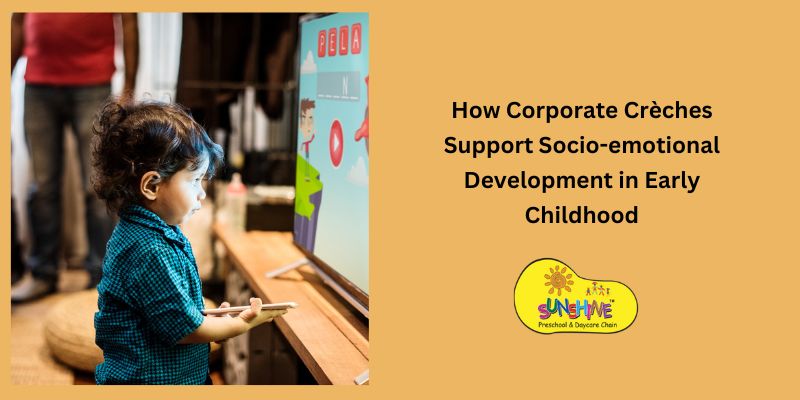How Corporate Crèches Support Socio-emotional Development in Early Childhood

Socioemotional development in early childhood is a crucial factor in determining a child's long-term emotional well-being and overall life success. Formative years, a period of rapid brain development, begin at birth and extend to about age 8. A significant portion, 90%, of brain development occurs before the age of 5. This period is crucial for laying the foundation for a child's cognitive, social, emotional, and physical development. During these formative years, children learn how to identify and manage their emotions, form relationships, and handle the complexities of social interactions. Corporate crèches are playing a crucial role in facilitating this development, offering working parents a structured environment where children can grow emotionally and socially while ensuring peace of mind for families juggling work and childcare.
In this blog, you’ll explore how corporate crèches contribute to children’s emotional and social growth, offering a balanced approach to development for both children and parents.
Understanding Socioemotional Development
Socioemotional development refers to how children learn to experience, express, and manage emotions, as well as their ability to establish meaningful relationships. It encompasses key areas such as:
- Emotional awareness: recognising and naming emotions
- Empathy: understanding and responding to others’ feelings
- Relationship-building: learning to connect, share, and cooperate
- Self-regulation: managing impulses and behaviour
Between the ages of 3 and 5, many children begin to express affection, engage in cooperative play, and show signs of empathy. These early milestones are deeply influenced by the quality of interactions children have at home and in care environments.
Research shows that nurturing, emotionally responsive early environments support better emotional regulation, higher self-esteem, and stronger interpersonal skills later in life.
The Role of Environment in Early Development
The environment where a child spends their early years plays a vital role in shaping their emotional and social development. A consistent and nurturing environment helps children feel secure, which is crucial for emotional regulation.
- Adult responsiveness: When caregivers respond to children's needs with sensitivity and attentiveness, it fosters trust and security.
- Positive peer interactions: Regular engagement with peers helps children learn vital social skills, such as cooperation, conflict resolution, and understanding others' perspectives.
- Psychological safety and routine: Children thrive in environments with a predictable routine. A structured day reduces anxiety and helps children build resilience.
In corporate crèches, children benefit from a carefully structured environment where both adults and peers provide regular opportunities for emotional and social learning.
How Corporate Crèches Cultivate Development
Corporate crèches are not merely childcare solutions, but they are carefully designed ecosystems where development is guided with intention. Unlike informal care arrangements, corporate crèches operate with:
- Trained caregivers who understand child psychology and age-appropriate responses
- Structured activities that foster both emotional and cognitive development
- Developmental tracking to observe and support each child’s growth
For example, a toddler who struggles with transitions may initially resist separating from a parent. A corporate crèche, with a predictable drop-off routine and a familiar caregiver, helps ease this resistance. Over time, the child learns to regulate their emotions, adapting to transitions with increasing independence.
Encouraging Social Skills Through Peer Interaction
One of the most significant benefits of corporate crèches is the emphasis on group play. This structured interaction with peers helps children develop essential social skills for future relationships.
- Turn-taking: Activities like sharing toys or playing games encourage children to wait their turn and cooperate with others.
- Empathy: Through group play, children learn to understand and share the emotions of their peers.
- Communication:Collaborative games and storytelling help promote communication skills, encouraging children to express their needs and feelings effectively.
Emotional Resilience Through Routine and Support
Children thrive on predictability. At corporate crèches, daily routines are consistent, with mealtimes, naps, and play sessions all occurring in a steady rhythm. These patterns help children develop:
- Emotional regulation during transitions like goodbyes or activity changes
- Trust in their environment, knowing what to expect each day
- Confidence, as they learn to manage minor setbacks and challenges
Moreover, when separation anxiety occurs, a corporate crèche handles it with experience, gradual goodbyes, visual cues, and responsive caregivers and makes the process less stressful, reinforcing a child’s emotional coping mechanisms.
The Parent-Child Connection in a Crèche Setting
Corporate crèches not only support children’s development but also strengthen the parent-child bond. Proximity and regular communication between parents and caregivers ease separation anxiety and help children feel secure.
- Parental involvement: Many corporate crèches provide regular updates to parents, helping them stay connected with their child's daily activities and emotional well-being. This involvement can help parents feel more confident in the care their children are receiving.
- Indirect support for family bonding: By reducing the stress of childcare arrangements, crèches allow parents to focus on their work, knowing their children are in a safe, nurturing environment.
This reassurance provides emotional stability for both parents and children, ultimately supporting family relationships.
Choosing a Development-Focused Corporate Crèche
For employers looking to implement impactful childcare solutions and for parents evaluating options, it’s important to consider:
- Caregiver training: Look for crèches that employ caregivers with experience in early childhood development and socioemotional learning.
- Emotional curriculum: Ensure the crèche has a structured curriculum that emphasises emotional awareness, empathy, and social skills.
- Play-based learning: Activities should be designed to encourage group interactions, creativity, and problem-solving.
- Regular feedback: Parents should receive regular updates on their child’s emotional and social development, with opportunities for observation and feedback.
Enhancing Workplace Productivity Through Quality Childcare
When children thrive emotionally, families and workplaces flourish. Corporate crèches don’t just ease the burden of childcare and they actively shape young minds through empathy, resilience, and meaningful connections. At the same time, they empower parents to bring their best selves to work, knowing their little ones are in expert hands.
At Sunshine Preschool & Corporate Crèche, we help businesses champion early development, creating happier and more productive teams. With proven, high-quality childcare solutions tailored for modern workforces, we make it easy to support your employees and invest in tomorrow’s leaders.
Contact us to make emotional well-being a business advantage. Let’s grow together.
Be the first to post a comment



Leave a Reply Cancel reply